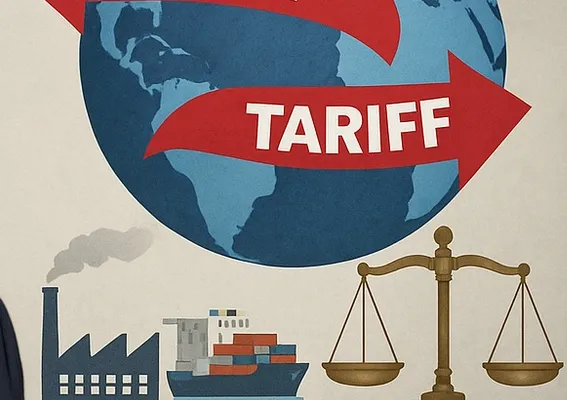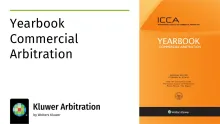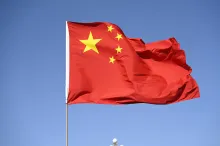Trump’s Reciprocal Tariff Policy, Multinationals, and Investment Treaties
September 19, 2025
President Donald Trump’s second term has been marked by a shift in the United States (“U.S.”) trade policy. The free trade policy adopted in U.S. foreign relations after World War II was replaced with President Trump’s Reciprocal Tariff Policy, as it was called in Executive Order 14257 of 2 April 2025, which resulted in the imposition of asymmetric tariffs on imports from different countries. While the Reciprocal Tariff Policy raises issues concerning possible violations of trade agreements, especially the General Agreement on Tariffs and Trade (“GATT”), it also raises the question as to whether the U.S. is in breach of investment treaties. Several multinational companies investing in the U.S. rely on the import of components from their parent companies used in the manufacture or assembly of domestic finished goods in the U.S. As such, one could wonder whether President Trump’s asymmetric tariffs amount to a breach of the most favoured nation (“MFN”) standard of treatment, to the extent that the unequal treatment given to imports from different countries may distort competition amongst multinationals.
In this context, this post examines the impact of President Trump’s Reciprocal Tariff Policy on multinationals investing in the U.S. and considers whether investment treaties might provide a basis for such companies to claim compensation for losses caused by adverse asymmetric tariffs.
Asymmetric Tariffs, Trade Deals, and GATT
From the outset of his second term, President Trump regarded tariffs as a powerful tool for achieving political objectives. In January 2025, President Trump announced the imposition of tariffs on Mexico, Canada, and China. On 2 April 2025, the so-called Liberation Day, President Trump announced the imposition of asymmetric tariffs on imports from several countries, justified on the basis of a purported reciprocal treatment given by those countries to American goods. Following Liberation Day, President Trump struck trade deals with different trade partners, which resulted not in trade liberalisation but in the rise of protectionism and unequal treatment of imports from different countries. The first trade deal was agreed with the United Kingdom in May 2025. In July 2025, President Trump announced trade deals with the European Union, Indonesia, Japan, South Korea, and the Philippines.
President Trump’s tariffs also led to complaints before the World Trade Organization (“WTO”). China was the first WTO member to request consultations pertaining to President Trump’s tariffs in February 2025, followed by Canada and Brazil. It is alleged that President Trump’s tariffs are inconsistent with tariff concessions made by the U.S. under Article II of GATT and the general MFN treatment set forth in Article I of GATT. The U.S., for its turn, evokes the essential security interest exception under Article XXI of GATT, which, according to the U.S., is a self-judging provision and is not subject to the WTO dispute settlement system.
The complaints presented against the U.S. focus on the impact of tariffs on imported goods and do not address the problems created to multinationals investing in the U.S. In many sectors, the business model adopted by multinationals relies heavily on the ability to import components used in the manufacture or assembly of domestic finished products. This is of particular importance in the automotive industry in the U.S., where foreign automakers import essential car parts, including engine, transmission, and electronics, from their parent companies in their home countries. As such, the imposition of asymmetric tariffs on imports from different countries impacts the ability of certain multinationals to compete in the U.S. market against multinationals whose home country benefits from a more favourable tariff treatment.
Given that the Agreement on Trade-Related Investment Measures (“TRIMs Agreement”) does not apply to measures that are inconsistent with the MFN clause in Article I of GATT, the TRIMs Agreement could not serve as the legal basis for a complaint addressing the problems created by asymmetric tariffs to multinationals operating in the U.S. One could argue, nonetheless, whether multinationals may avail themselves of the MFN clauses set forth in investment treaties concluded between the U.S. and their home countries.
MFN Clauses in U.S. Investment Treaties
MFN clauses are found in all investment treaties concluded by the U.S. In earlier investment treaties, the MFN clauses applied to treatment conferred “in like situations” or “in like circumstances” on the investment and on “associated activities,” subject to a list of exceptions. For instance, the first bilateral investment treaty (“BIT”) concluded by the U.S., the U.S.-Panama BIT, provides that:
“Each Party shall permit and treat such investment, and activities associated therewith, on a basis no less favorable than that accorded in like situations to investment or associated activities of its own nationals or companies, or of nationals or companies of any third country, whichever is the more favorable.”
Some of the earlier investment treaties concluded by the U.S. set forth a definition of associated activities. An example is the U.S.-Ecuador BIT, which provides that associated activities include:
“the organization, control, operation, maintenance and disposition of companies, branches, agencies, offices, factories or other facilities for the conduct of business; the making, performance and enforcement of contracts; the acquisition, use, protection and disposition of property of all kinds including intellectual property rights; the borrowing of funds; the purchase, issuance, and sale of equity shares and other securities; and the purchase of foreign exchange for imports.”
In the North American Free Trade Agreement (“NAFTA”)’s Chapter Eleven and BITs that followed the U.S. Model BIT 1994, the concept of associated activities in MFN clauses was replaced with a new subject matter, defined by reference to “establishment, acquisition, expansion, management, conduct, operation, and sale or other disposition of investments in its territory.” For instance, the last BIT concluded by the U.S., the U.S.-Rwanda BIT, provides as follows:
“Article 4: Most-Favored-Nation Treatment
1. Each Party shall accord to investors of the other Party treatment no less favorable than that it accords, in like circumstances, to investors of any non-Party with respect to the establishment, acquisition, expansion, management, conduct, operation, and sale or other disposition of investments in its territory.
2. Each Party shall accord to covered investments treatment no less favorable than that it accords, in like circumstances, to investments in its territory of investors of any non-Party with respect to the establishment, acquisition, expansion, management, conduct, operation, and sale or other disposition of investments.”
This wording was employed in U.S. trade agreements containing investment protection, such as the successor of NAFTA’s Chapter Eleven, the USMCA, and bilateral free trade agreements concluded with Singapore, South Korea, and Australia.
MFN Clauses and De Facto Discrimination
The asymmetric tariffs apply to the imports on the basis of the origin of the imported goods, regardless of the nationality of the importer or the final consumer. As such, on their face, the asymmetric tariffs do not discriminate investors and investments of investors because of their nationality. The question, however, is whether asymmetric tariffs amount to a de facto discrimination in breach of the MFN clause, given that they can affect competition amongst multinationals investing in the U.S.
De facto discrimination was argued in disputes arising under investment treaties concluded by the U.S. in the context of the national treatment standard, including cases such as S.D. Myers v. Canada, Pope & Talbot v. Canada, Corn Products v. Mexico, and Cargill v. Mexico under NAFTA’s Chapter Eleven, where it was acknowledged that the national treatment standard applied to both de jure and de facto discrimination.
But the challenge for multinationals affected by asymmetric tariffs is to establish that the levy on imports relates to the subject matter of the MFN clause. Pursuant to the ejusdem generis rule, as defined by the International Law Commission in the Draft Articles on most-favoured-nation clauses, MFN clauses apply to “only those rights which fall within the limits of the subject-matter of the clause.” The subject-matter of the MFN clause may vary from one investment treaty to another.
In general, if a claim is pursued under one of the first investment treaties concluded by the U.S., it must be established that there is less favourable treatment “in like circumstances” (the comparator) in relation to an “associated activity,” and that the asymmetric tariffs do not fall within one of the exceptions listed in the treaty. Under investment treaties and free trade agreements with provisions on investment protection concluded after the U.S. Model BIT 1994, instead of “associated activity,” it must be established that the less favourable treatment affects “the establishment, acquisition, expansion, management, conduct, operation, and sale or other disposition of investments in its territory.”
Conclusion
President Trump’s Reciprocal Tariff Policy may severely impact competition among multinationals investing in the U.S. Given the importance of imported components to the manufacture and assembly of domestic finished products in certain industries, particularly the automotive sector, multinationals whose imports are subject to higher tariffs are placed at a disadvantage compared with market players benefiting from lower tariffs.
In this context, a claim of de facto discrimination, in breach of MFN clauses contained in investment treaties and free trade agreements with investment protection provisions concluded by the U.S., may constitute a valuable mechanism for multinationals affected by asymmetric tariffs to obtain compensation for their losses.
You may also like











